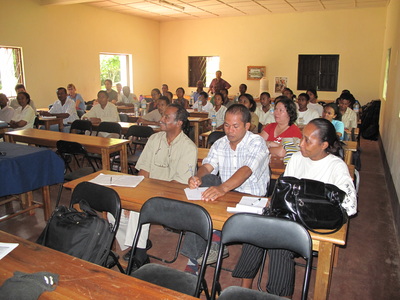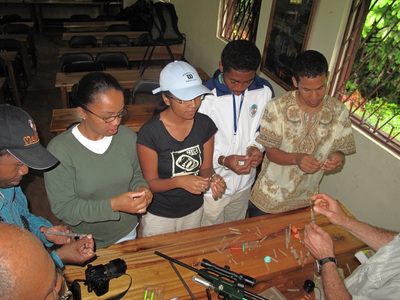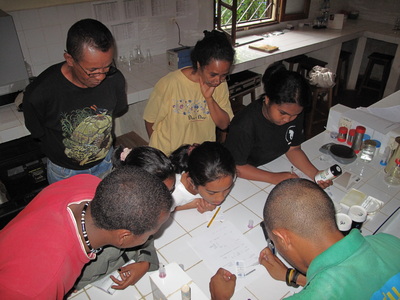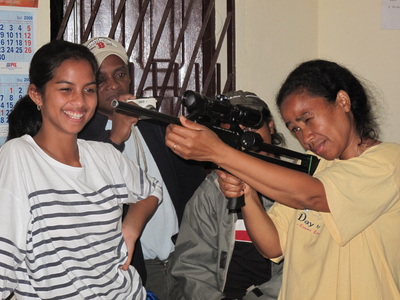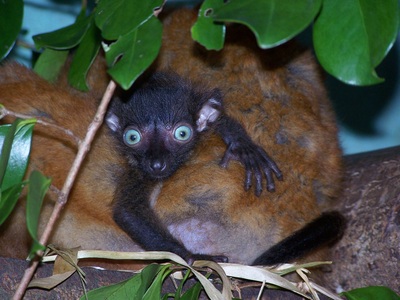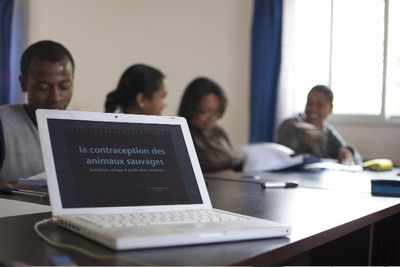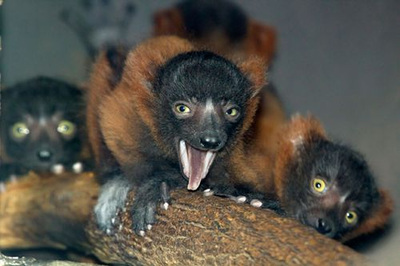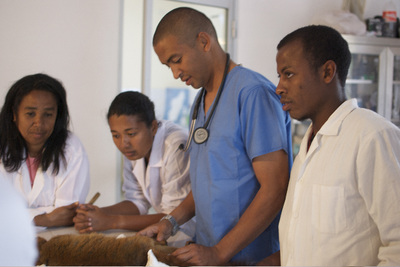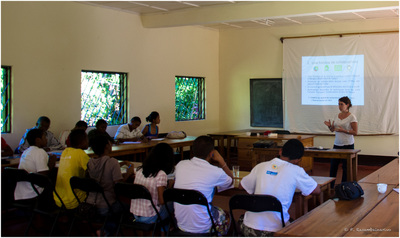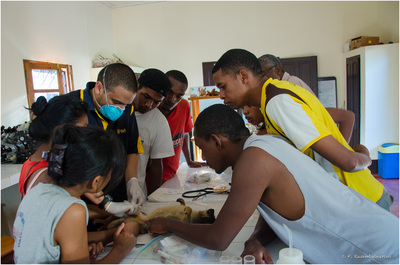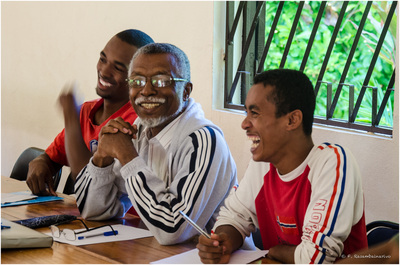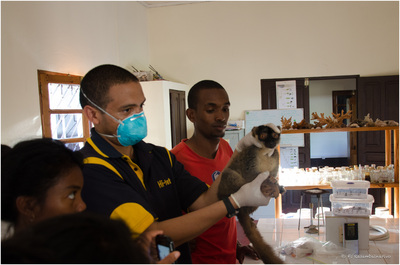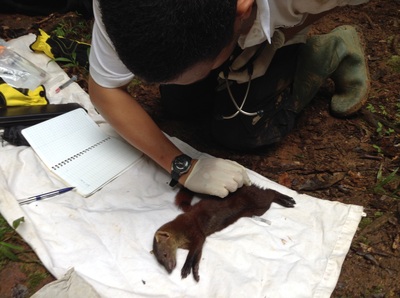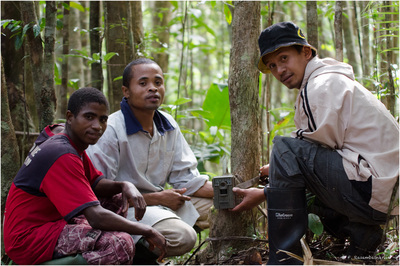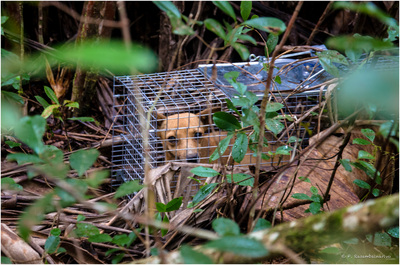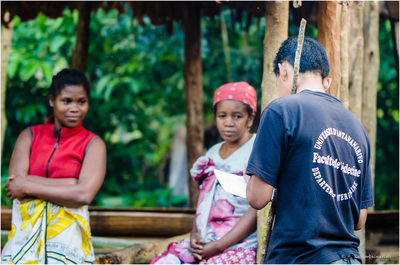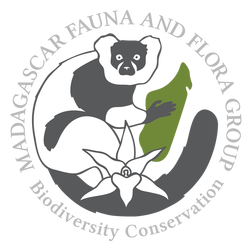Introducing Veterinary Students to Conservation Medicine
The Department of Veterinary Sciences and Medicine (DESMV) of the University of Antananarivo is the only French speaking veterinary school in sub-Saharan Africa. Created in 2001, the DESMV provides training to the next generation of Malagasy veterinarian for the benefit of human and animal health in Madagascar, including the wildlife. In order to grow local expertise on Malagasy wildlife health, the DESMV partnered with Madagascar Fauna and Flora Group and created the Zoo and Conservation Medicine Club (ZCMC) in 2008.
The ZCMC is a group of veterinarians and students interested in zoological and wildlife health and medicine. Its’ goals are to provide a venue for students seeking an opportunity to learn about wildlife health and conservation through various activities that offer members with additional in depth or focused training in aspects of wildlife health such as workshops, conferences, lectures and discussion groups.
The ZCMC is a group of veterinarians and students interested in zoological and wildlife health and medicine. Its’ goals are to provide a venue for students seeking an opportunity to learn about wildlife health and conservation through various activities that offer members with additional in depth or focused training in aspects of wildlife health such as workshops, conferences, lectures and discussion groups.
In 2009, the ZCMC received a grant from the Brookfield Zoo for the development of the conservation medicine club and organized its first workshop held May 18-21, 2009 at Parc Zoologique Ivoloina. This four-day workshop was aimed at giving extra training to veterinary students and a platform for professionals to discuss conservation issues facing Madagascar's endemic species. The workshop was attended by 16 veterinary students from the DESMV as well as 16 experts in various fields of wildlife conservation, medicine and research from around the world. In addition to lectures and research presentations, students had the opportunity to gain hands-on experience in manual restraint of lemurs, carrying out a physical examination of a lemur and tortoise, the use of remote injection techniques and basic laboratory work.
The ZCMC organized a second workshop at Parc Botanique et Zoologique Tsimbazaza (PBZT) in 2010 that was attended by students and PBTZ staff. The workshop was focused on mammalian reproduction and the use of contraception in lemurs. Talks included a presentation on the different contraceptive methods currently available for use in wildlife, factors that should be considered when deciding upon the most appropriate method for the species in question and for that particular individual as well as a talk on use and need for contraception in the management of captive wildlife, including endangered species. And because a number of male lemurs were scheduled to be neutered, there was also an opportunity to practice basic surgical techniques.
The ZCMC organized a second workshop at Parc Botanique et Zoologique Tsimbazaza (PBZT) in 2010 that was attended by students and PBTZ staff. The workshop was focused on mammalian reproduction and the use of contraception in lemurs. Talks included a presentation on the different contraceptive methods currently available for use in wildlife, factors that should be considered when deciding upon the most appropriate method for the species in question and for that particular individual as well as a talk on use and need for contraception in the management of captive wildlife, including endangered species. And because a number of male lemurs were scheduled to be neutered, there was also an opportunity to practice basic surgical techniques.
In 2014 the MFG and DESMV renewed their Memorandum of Understanding for another five years, thereby reaffirming their commitment to collaborate. Both organizations recognize the importance of conserving Madagascar's biodiversity and thus the importance and need for all Malagasy veterinarians to be trained in the basics of wildlife and conservation medicine and for some Malagasy veterinarians to specialize in the field. It is simply not cost-effective or practical to rely on international veterinarians to address all health and disease issues that arise in Madagascar. As such, both organizations value and are committed to advancing the activities organized and held by the ZCMC as was demonstrated by the support both provided for a May 2014 workshop on zoo and wildlife medicine held at Parc Ivoloina. Sixteen students in their fifth and sixth year of veterinary school along with one professor participated in the three-day event. Various subjects including the “one health” concept, conservation medicine, hematology, parasitology, reproduction and contraception applied to Malagasy wildlife were covered. Students also had the chance to practice performing physical examinations of lemurs and basic laboratory work. In addition, Lea Giraud from the Association Reniala, the first ring tailed lemur (Lemur catta) rescue center, gave an overview of conservation issues in southern Madagascar and detailed the objectives and current activities of the Association. The ZCMC hopes that similar events will be held at least annually and that consideration is given to incorporating the workshops into the veterinary student’s curriculum.
In addition to organizing events, the ZCMC also facilitates developing connections between professionals and veterinary students who are seeking opportunities to serve as an extern or otherwise assist wildlife veterinarians in the field. To date, a number of ZCMC-member students have been able to gain field experience by participating in Dr. Randy Junge's island-wide biomedical survey of lemurs or taking part in a study on health and diseases of wild and domestic animals at the human / wildlife interface with Dr. Fidisoa Rasambainarivo.

